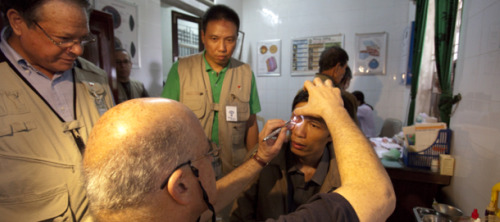A non-profit with zero overhead, Israel’s Eye from Zion is restoring sight to hundreds of people in developing countries.

“At first, I thought I’d die.” That’s what an ex-Mossad (Israel’s Institute for Intelligence and Special Operations) chief said about his first “operation.” Yoram Hessel, now the director of Eye from Zion, wasn’t talking about a secret operation for the Israel government. He was referring to sight-restoring cataract surgery that he had witnessed firsthand.
After observing about 50 cataract operations in countries such as Vietnam, China and the Muslim country of Azerbaijan, Hessel, now an international businessman with his consultancy Vintage Crown is overflowing with enthusiasm about how a relatively straightforward operation can change peoples’ lives. In addition to his career in business, Hessel donates his time to Eye from Zion to restore sight to people in developing countries.
He’s seen cataracts the size of buttons removed from people’s eyes. “It’s amazing what you get out of the eye, what they take out,” he tells ISRAEL21c.
Eye from Zion grew out of the vision of Israeli businessman Nati Marcus. Since its founding about three years ago, it has grown into a core group comprising five or six influential Israelis like Hessel. With their help, through missions undertaken by dozens of Israeli doctors who donate their time and expertise, Eye from Zion has restored sight to hundreds of people.
With an industry standard tool called a Phaco machine, the Israeli eye doctors use sound waves to blast out a cataract, breaking it into pieces and then sucking it out. Most of the patients who arrive at the mobile clinic are nearly or completely blind in both eyes.
Opening doors
Running a tight ship, with all donations made to the non-profit organization going directly to the operations, no one at Eye from Zion takes a salary says Hessel. “We don’t even have an administrator,” he adds. “Nobody is paid.”
With folks like Hessel on the team, who are experienced in international relations, it is relatively easy to open doors for the organization that packs up its own equipment, and arrives in the destination country to find patients already lined up and waiting.
“The whole idea is that we can do the operations in a way that is very flexible. We are unlike any other organization… we bring all our equipment ourselves, set up a clinic and start operating,” Hessel explains.
The Israeli embassies in the respective countries in need are in contact with foreign ministries and ambassadors. Officials from the countries are often happy to accompany the Israeli medical team and volunteers, Hessel adds.
And yes, a past working with the Mossad does help to open doors at foreign ministries, he admits. When working for the Mossad, which is much like the CIA in the US, Hessel spent 22 years abroad, which is how he acquired his vast experience in international affairs.
An eye on training the future
The need for these cataract operations is pressing, says Hessel. In countries like Israel the moment someone gets blurred vision, they go for eye tests and the problem can be solved, but in developing countries, or those with less effective medical care, cataracts can lead to blindness.
Marcus had the idea of offering this operation free of charge to those in need, says Hessel. “He is really the spirit. It was his idea and he donated some capital to start working. We also get help from MASHAV [the Israel Foreign Ministry], and we get a lot of support from the JOINT, a Jewish organization, and also from MADA [Israel’s version of the Red Cross]. “It’s one thing to send flour and water to disaster areas, but it’s another to send doctors.”
Eye from Zion is now planning a mission to Myanmar. It also aims to travel to Sri Lanka. Part of the idea is to send doctors back to Israel for training, so doctors in developing countries can learn to take care of their own. Two women from Myanmar have already been trained in Israel.
And finding people outside the capital cities is important to the organization. “We don’t normally operate in the capitals. We go to the countryside, to the land’s end, to the people who are really needy,” Hessel relates.
Repairing the world, eyes first
Early this year, a Vietnamese woman in her early 30s who had been blinded by cataracts came to Eye from Zion. Hers was an especially severe case, says Hessel, because her family believes she was poisoned by Agent Orange during the Vietnam War. Eye from Zion succeeded in brightening the darkness of her life.
“Tikkun Olam is the mission, this is the name of the game,” says Hessel, referring to the Jewish ideal of “repairing the world.”
“We are a non-profit, with no hidden agenda,” he continues. “No one in the organization has a credit card from the organization. All our funds go right to the people, right to buy medical equipment.”
Of course money always helps, he concedes. “We are talking about the poorest people. If we wouldn’t do this, they wouldn’t have a solution. But think about it: There are 80 million people in Vietnam. Two hundred operations won’t change their basic problems, but to the individual it is a mammoth change. For Judaism that is a big thing.”












